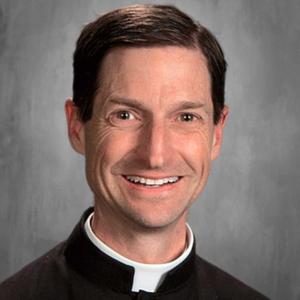
Sermons of Fr Paul Robinson SSPX
Fr Paul Robinson
Sermons of Fr Paul Robinson SSPX (Society of St Pius X)
- 19 minutes 36 secondsLife is a Contest of Love between God and Us, Sermon by Fr. Paul Robinson, SSPX
- This life is a contest of love between us and God.
- When we were in the seminary, we priests learned in moral theology that God has total dominion over all things, while we have partial dominion over some things. What this means is that everything that we have and that we are belongs to God, while we are only stewards of those things.
- You car belongs to God. Your house belongs to God. Your children belong to God. You belong to God. God has given you these things, but He has only made you a steward over them, an administrator of them. He has not given you the authority to do with them whatever you want.
- Why has God done this? Because He is your Father, because He loves you, because He cares about you. Because He wants this life to be a contest of love.
- It is sad that in the Enlightenment and Protestant world that we live in today, most people do not want such a God. They do not like a God Who only gives them a partial control over the things they give them, use and administration but not total ownership.
- And so they invent a God more to their liking. They invent the Freemasonic God, the Deist God. The Freemasonic God is a manufacturer; He is not a Father. He makes us but then He does not expect anything of us.
- Think about how it works with a car manufacturer. The cars roll off the manufacturing line. You go to buy one, you like it, you pay the price for it, and you drive it off. Does the manufacturer care what you do with the car after that point? No, not at all! You can use it for transportation; you can use it for target practice; you can use it for off-road racing, whatever.
- Modern people tend to want God to be like the manufacturer, where He gives us our life, we are born into this world, and then He does not care at all what we do with our life from that point. We can become an Catholic or an atheist, a Buddhist or a Baptist. We can be faithful or unfaithful, we can be loving or hating, we can be selfish or unselfish. God doesn’t care.
- The thing is, however, this God does not exist. He is a false god, an idol created by modern man so that he can worship himself and his own free will.
- The real God is a father. A father does not just beget children and then leave them to do whatever they want. No, a father instructs his children, looks after his children, sets expectations for his children, makes demands of them. He wants to be united with them.
- Whenever a father gives something to his child, he does not give it unconditionally, he does not give it to be used however the child wants. The father gives the child life, gives the child his own name, gives the child food and clothing, gives the child the Catholic faith and a Catholic education. And he expects the child to use all of these things wisely and well.
- Notice that with the manufacturer, there is no union in selling the car. The good father and child, however, are on the same page, think the same way, want the same thing. They have love.
- What this means is that this life is a contest of love. God has set up our life such that He showers us with love through His gifts and then tests us to see if we are going to take those gifts and use them to love Him in return, or if we are going to take the gifts and use them for our own purposes.
27 January 2025, 2:45 pm - 18 minutes 52 secondsThe Prayer of the Holy Family, Sermon by Fr. Paul Robinson, SSPX
#SSPX #prayer
- When God created man, at the same time He wanted to create the human family. He created one man and one woman, Adam and Eve, and then He married them. He made them two in one flesh.
- When God Himself chose to come down upon this earth in the fullness of time, He chose to do so in a family. The family had existed for the entire history of man up to that point, but now mankind would have a perfect example of what a family should be in this holy family, where you have God, the Mother of God, and the foster father of God.
- Families today are reminded not only that they belong to an institution that God has created but an institution that He has modeled for us.
- There are many aspects of the life of the Holy Family that we could speak about but today I particularly want to focus upon their example of prayer.
15 January 2025, 3:05 pm - 17 minutes 13 secondsService of Christ vs. Relational Autonomy, Sermon by Fr. Paul Robinson, SSPX
- Today, we honor the holy name of Jesus. The Church has a special feast dedicated to this name. The name is holy because it came directly from God. It was given to Our Lady by the angel Gabriel just before she conceived Our Lord in her womb. It was given to St. Joseph by an angel in a dream when he was wondering what he should do about the pregnancy of Our Lady.
- Our Lady and St. Joseph gave Our Lord the name of Jesus on the day of His circumcision, in obedience to the will of God.
- The name is one of a role. It indicates both the purpose of Our Lord’s life and who He is. He is one who saves. He is a rescuer. That is what it means to be a savior.
- In the case of Our Lord, there is no other savior. He is the only rescuer who is able to save us from death. No can bring us to life besides Him. No one is both God and man besides Him.
- This is why it is an honor for us to serve Him. It is an honor for us to serve the one alone who is the savior of the human race, the one alone who is the God-man.
- It is an honor for us to defend His name because “there is no other name under Heaven given to men whereby they may be saved”.
- It is important for us to understand that, without Our Lord, we are lost, whereas with Our Lord, we have true fulfillment in this life and the next.
- Our Lord teaches us the true meaning of our lives, He teaches us how to live them in order to attain happiness, and He gives us the means to live them that way through His grace in our souls. His teaching contains a paradox that is mysterious but true.
- He says, “He that finds his life, shall lose it: and he that shall lose his life for me, shall find it.” He says this right after saying, “He that loves father or mother more than me, is not worthy of me; and he that loves son or daughter more than me, is not worthy of me. And he that takes not up his cross, and follows me, is not worthy of me.” (Matt. 10:37)
- When you serve the noble and true ideal of following Our Lord in this life, and this is the highest ideal possible, you flourish in your life. When, on the other hand, you refuse to serve Our Lord and serve yourself instead, your life is very poor.
7 January 2025, 11:55 pm - 20 minutes 40 secondsThe Christ Child and the Slave/Rebel Paradox, Sermon by Fr. Paul Robinson, SSPX
The life of man is marked by a paradox: there is in each one of us the desire to serve another because of the fact that we are creatures, but there is also in us the desire to be independent such that we want to stand on our own feet and be free from all control.
- Firstly, we have a desire to serve another. We cannot avoid the obvious fact that we are limited and helpless in many respects.
- We try to do things and we fail. Others have talents that we do not. We have a lot of desires which we recognize we have no power to realize.
- This leads us to look for someone to follow who is more powerful, more capable, who is able to protect our interests and help us achieve what we desire in a much greater way than we could by ourselves. This is why everyone wants a hero to follow.
- We live at a time in history when the importance of independence is emphasized in society more than it has ever been. Yet there is no less hero worship today than in the past.
- At the same time, we want to be independent, to be in a state where we do not serve anyone else. We have a fear of serving because we find it hard to trust anyone ruling over us. We realize that if we give ourselves over to serve another, that person might take advantage of us and make our lives worse instead of better.
- There is great suspicion today regarding everyone who holds power. There is a belief that power necessarily corrupts people. And so, the more power that they hold, the more corrupt they will be.
- Plus, we do not like to be told what to do. We feel like the act of obedience causes us to surrender our free will, something that is very precious to us.
- When we face this paradox that exists within us—that we both want to serve and we do not want to serve—we have a number of possibilities as to how we will face it.
31 December 2024, 9:10 pm - 14 minutes 40 secondsChristmas and Our Human Condition, Sermon by Fr. Paul Robinson, SSPX
- Christmas is the night when God gives Himself to us. Isaias gives us a name to call Our Lord when He comes: “God with us”. And he also emphasizes: “A child is born to us. A child is given to us.” It is difficult for us to understand because it exceeds our understanding.
- God is born, in person. God is born for you, for your sakes.
- There is a particularity about Christmas, a concreteness, that has to be noticed and emphasized. There are many ways to look at the Nativity scene, many ways to contemplate it. But tonight, at least, I would like you to think about what it would be like if you were the only one there. Just you and the divine Child.
- When we are there alone with the Christ Child, we are going to realize something right away. We are going to realize that our human condition is important.
- We are going to look at this Child and say to ourselves, “God is a pure spirit, infinite, eternal, all-powerful. Yet He takes on flesh; He becomes human and He confines Himself within the limits of the human nature that He has created. He has started off as an infant, just like I did, an infant that cannot talk, that cannot walk, that cannot feed itself, that is helpless in every way.”
- The Christ Child is saying to us, “I have come to be close to you in the very human nature that I gave to you. I have taken on your human nature, as a gift to you. You must accept your human nature as a gift from me. You must reach your salvation through the limits of your human nature.”
- By that, I mean that we have to live in and love the reality that God has made for us.
- The limitations of our body: sometimes healthy, sometimes sick
- The limitations of a world tainted by sin: sometimes good, sometimes evil we cannot stop
- The limitations of desire: sometimes desires realized, many times desires that cannot be realized
30 December 2024, 3:31 pm - 17 minutes 42 secondsBeing Chosen by God, Sermon by Fr. Paul Robinson, SSPX
#homily #gaudete
- For the past month, there has been a lot of news concerning who President Trump is choosing to be part of his next cabinet when he takes over the reins of government on January 20.
- When a new name is announced and you read the reaction of the person chosen, you hear them saying something like, “I would like to thank President Trump for his trust in me. This is the honor of my life. I will do my utmost best to serve the American people”.
- Whenever a person in a place of power singles out someone and chooses them for a particular role, that person feels honored and has a great desire to the do the task assigned.
- This is how the Apostles felt when they were chosen by Our Lord Jesus Christ to be His followers and the leaders of His newly-formed Church. He told them at the Last Supper, “You have not chosen me but I have chosen you and appointed you that you should go, and bring forth fruit, and your fruit should remain” (Jn. 15:16)
- St. Paul would often begin his epistles by saying, “Paul, called to be an apostle of Jesus Christ by the will of God” and would emphasize that he received his mission from God Himself.
- Throughout this time of Advent, there is a figure who appears time and again in the Gospels, the precursor of Our Lord Jesus Christ, St. John the Baptist. At the end of every Mass, we read about him that, “There was a man sent from God whose name was John. This man came for a witness, to give testimony of the light, that all men might believe through him.” (Jn. 1:6-7)
- St. John today makes the bold claim that he is a figure fulfilling a prophecy of Isaias some centuries before that there would be a prophet who would prepare the way for the Messias.
- We still speak of these figures today, and especially of Our Lady, because they were given important roles in the kingdom of God. It is one thing to be given a role by a powerful man; it is quite another thing to be given a role by Almighty God.
15 December 2024, 10:19 pm - 14 minutes 20 secondsWhat Will I Say to Our Lord on the Last Day?, Sermon by Fr. Paul Robinson, SSPX
St. Isidore Capital Campaign website: growstisidore.org
- Today, I want to speak to you about glory.
- It’s the second Sunday in a row that we have a Gospel about the Last Judgment.
- Typically, when we think of the LJ, we think of a terrifying spectacle, where the world will be consumed in fire, where everyone on the earth will die, where all nations and towns will be wiped away. No more Denver, no more NYC, no more USA.
- It is true that the LJ will be a day of wrath, a day of trembling and mourning.
- But it will be a blessed day for the saints. It will be the day that they enter into their glory, body and soul.
- It is the day that Our Lord will say to them, “Well done, good and faithful servant, come take possession of the kingdom prepared for you from the beginning of the world.”
- This is what we want to happen to us on that day. We want to hear Our Lord say to us that He is going to give us possession of a kingdom.
- We should want to receive as much glory as possible on that day. It is good for us to desire heavenly glory!
- But it is not enough to desire it; we must also ask ourselves what we must do to receive it.
- This is a “thought experiment” that St. Ignatius has us do when we are on retreat.
- When I appear before OL one day for my judgment, what will I wish that I had done?
- What things will I have done that I will be glad about?
- What things will I have done that I wish I did not do?
- What things will I have left undone that I wish I had accomplished?
2 December 2024, 2:56 am - 15 minutes 36 secondsSt. Justin's Defense of the Resurrection, Sermon by Fr. Paul Robinson, SSPX
#resurrection #catholic
- At the beginning of the second century, around the year 100, a man named Justin was born in the city of Flavia Neapolis. That is a town in modern day Palestine.
- Growing up, Justin was educated as a philosopher in the school of Platonic philosophy. He was a pagan and he heard talk about a group of people called Christians. He was told that they were terribly immoral people.
- But this did not make sense to Justin. He saw the Christians appearing before Roman judges and willingly being martyred for Christ. He said to himself that it was impossible that they would be doing this while living an evil life or a life of pleasure.
- St. Justin went on to investigate Christianity and become a convert. Since he came from the pagan world and understood it well, he was in a good position to make the right arguments with the pagans to convert them to Catholicism.
- St. Justin was eventually martyred when he was about 65 years old and we celebrate his feast day on April 14.
- One of the things that St. Justin tried to do was to convince the Roman emperor, Marcus Aurelius, to stop putting Christians to death. For this end, he wrote two works of explanation and defense of the Catholic faith that were called “Apologies”. This does not mean that he was saying sorry in these works; rather, Apology was a Greek word meaning “a formal defense of one’s opinions and conduct”.
- There is one part of St. Justin’s first Apology that I would like to focus upon today. It is the part where he defends the resurrection of bodies and his defense relates to today’s Gospel.
17 November 2024, 10:00 pm - 19 minutes 14 secondsFarming and Spiritual Growth, Sermon by Fr. Paul Robinson, SSPX
#Catholic #SSPX
- Whether you drive to St. Isidore’s from Byers or Bennett, Aurora or Denver, or elsewhere, you come to a church in a rural setting, surrounded by farmland.
- You come to a church that was built by farmers and which is dedicated to a saint who was a farmer, St. Isidore.
- You come to the traditional Latin Mass, which often presents Gospels for your reflection that have some relation to farming. There are at least eight Sundays of the year when this happens. This Sunday and next Sunday are two examples.
- The reason for this is that Our Lord often drew from farming in His teaching. He compared Himself to a shepherd and us to sheep.
- He compared the Church to a field and us to plants. He talked about seeds being planted and bearing fruit, or landing on the wrong ground and not bearing fruit, about seeds growing up with weeds. He talked about mustard seeds, about vines and vineyards. He compared people to trees and said that we should judge them according to their fruits: how they act and what effect they have on others.
- Our Lord once came upon a fig tree and cursed it for being barren as a symbol of a soul not making progress; He told us that we should look at fig trees to know what season we are in.
- Our Lord is the Creator of Heaven and Earth. So, we should not be surprised that, when He comes from Heaven down onto this Earth, He teaches us about Heaven using the things of Earth. He teaches us about His design of Heaven using analogies with His design of Earth.
- One of the main things that Our Lord is teaching us when He compares us to plants is the duty we have to grow in holiness over the course of our life. It is not acceptable to Our Lord that He would give us this life as a time to make our way to Heaven and then we end up using it for other things.
10 November 2024, 11:03 pm - 16 minutes 53 secondsCatholic Politics, Sermon by Fr. Paul Robinson, SSPX
- As we come to the feast of Christ the King this year, everyone has politics on their mind. There are important elections coming up in less than two weeks that will decide the course of our country for the next four years.
- The coincidence of this feast and the elections provides for us an opportune moment for us, as Catholics, to remind ourselves of our politics.
- Our political stance is very simple: we have a king to whom we pledge our wholehearted allegiance, Our Lord Jesus Christ. We recognize Him as our God, our Redeemer and as the head of the race to which we belong, the human race.
- We strive with all of our might to submit our entire lives to Him, to follow His will in everything that we do. It is an honor for us to be able to serve Him.
- We believe that He established a Church that is a divine institution, the Catholic Church, and that this Church communicates to us the truths that our King came to teach us and the way of life that our King wants us to follow.
- We know that when we serve this King by living a devout Catholic life and especially by following Him on the royal way of the cross, He gives us a share in His royal power. He gives us the power to rule over the world, the flesh and the devil.
- Through our service of Christ our King, we become truly free. We have the ability to refuse all that works to destroy us; we have the ability to direct ourselves towards our true good.
- We know that, if we are faithful to our King during this life, we will be given a kingdom in the life to come. We will be given a share in the eternal reign of Christ the King for all eternity in Heaven. We will join in the triumph of Our Lord, Our Lady and the saints forever.
- This is our politics; this is our plan for our life. For us, Our Lord Jesus Christ is everything.
30 October 2024, 1:37 pm - 20 minutes 21 secondsSSPX Bishops, Sermon by Fr. Paul Robinson, SSPX
- With the sudden death of Bishop Tissier de Mallerais on October 8, there are many who are concerned about the future of the SSPX, realizing that the SSPX needs bishops to survive.
- This is a good moment for us to remind ourselves about three things: why the consecrations of bishops took place in 1988; why there have not been more bishops consecrated since then; and what we might expect for the consecration of bishops in the future.
20 October 2024, 10:46 pm - More Episodes? Get the App
Your feedback is valuable to us. Should you encounter any bugs, glitches, lack of functionality or other problems, please email us on [email protected] or join Moon.FM Telegram Group where you can talk directly to the dev team who are happy to answer any queries.
 Padre Peregrino
Padre Peregrino
 SSPX Podcast
SSPX Podcast
 Return To Tradition
Return To Tradition
 Timothy Gordon Rules for Retrogrades Podcast
Timothy Gordon Rules for Retrogrades Podcast
 SSPX Sermons
SSPX Sermons
 Dr Taylor Marshall Podcast
Dr Taylor Marshall Podcast